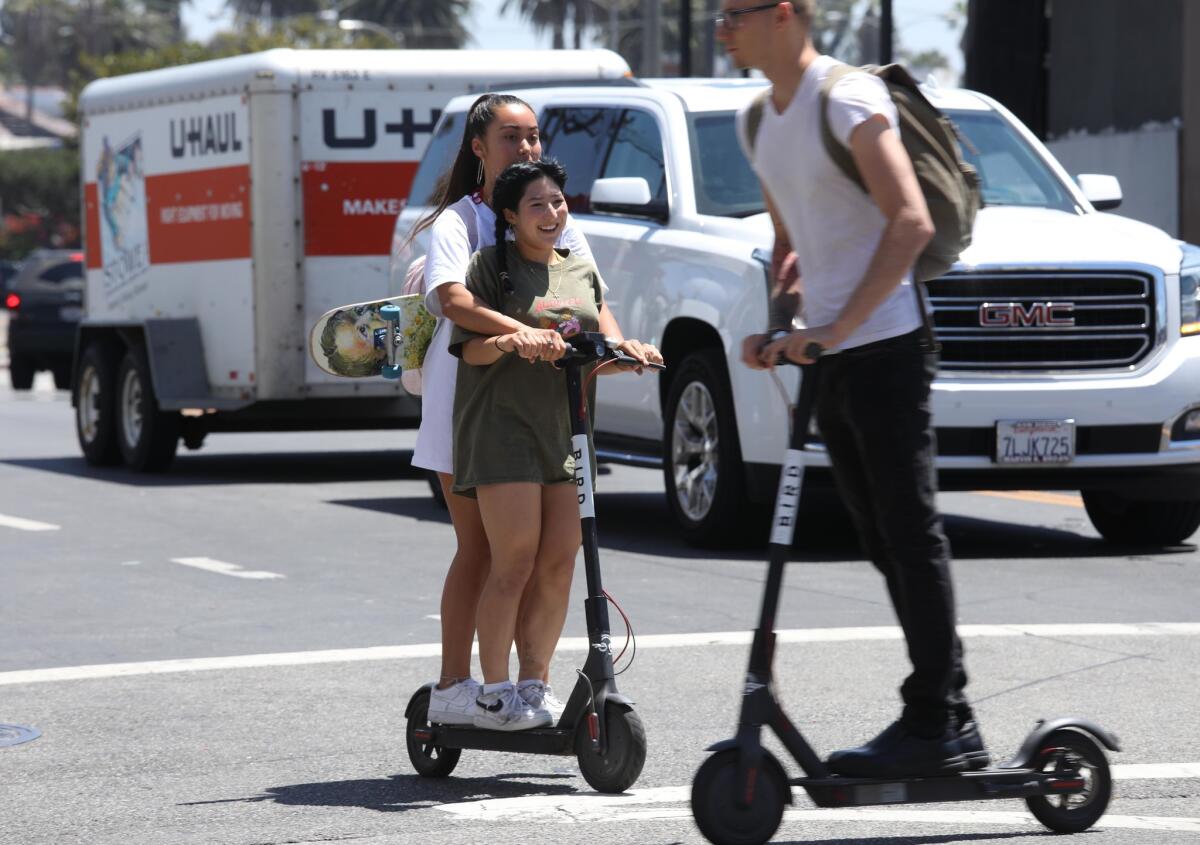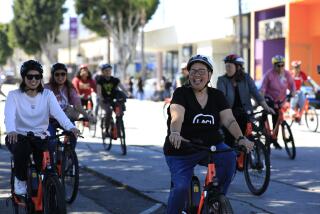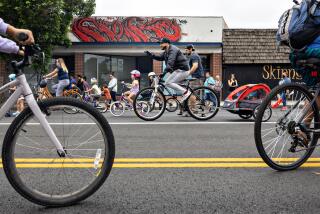Editorial: How much responsibility do scooter companies have for the bad behavior of their users? A lot

Forget about presidential politics. The most controversial and divisive issue in Los Angeles these days may be scooters.
Over the last few months, some 36,000 shared electric scooters and bicycles have been allowed onto the city’s streets, as part of a one-year pilot program to study how so-called micromobility vehicles can be used and regulated in L.A. In some neighborhoods, you can’t travel a block without seeing a scooter parked on — or dumped on — the sidewalk, and customers have taken around 2 million rides since the beginning of the year.
But the city is split at the moment into two camps: scooter lovers, who say the rent-per-ride vehicles are a cheap, convenient way to travel short distances without getting into a car, thereby helping reduce tailpipe pollution and traffic congestion. And scooter haters, who say the vehicles are big, possibly dangerous toys being used irresponsibly and left cluttering the sidewalks when the joy ride is over.
They’re both right.
The scooter lovers are certainly correct that in this traffic-clogged, smoggy city, people need more travel alternatives to cars. Shared scooters and bikes are especially helpful as “first-mile, last-mile” vehicles to move people between their homes or jobs and transit stations. The growing number of scooter riders helps build the case for more protected lanes and redesigned roads that make the streets safer for bicyclists, scooter riders and walkers too.
But the skeptics raise legitimate gripes about the private companies that have, in some neighborhoods, inundated public spaces with scooters but failed to hold their customers accountable. So far, the companies have talked about educating riders and offering them incentives for good behavior, but problems persist. (During the first five months of the pilot project, the city received more than 3,000 complaints about scooters through its 311 app.) How much responsibility should scooter companies bear for the rude, irresponsible or downright dangerous behavior of their customers?
A lot. Scooter companies have essentially introduced a new type of vehicle to the transportation landscape. They have an obligation to make sure their customers know the rules of the road and adhere to the proper etiquette governing how to ride and park the vehicles.
After mostly welcoming scooters with open arms, Los Angeles officials are now considering following the lead of Chicago and some other cities and fining companies when rules or laws are broken. The city already requires companies to respond within two hours to complaints of broken, toppled or improperly parked scooters. If the companies are unresponsive over a long period, they eventually risk losing their permit to operate.
Now, new penalties are being proposed, ranging from $50 for failing to respond to a service request within two hours to $1,500 if a company’s customers repeatedly and consistently park their scooters improperly. (Separately, the Los Angeles Police Department has begun ticketing riders for riding on the sidewalk, which isn’t allowed.)
Ideally, the city won’t need to levy steep penalties on companies. Scooters are still new, and some of the problems may resolve themselves if scooters become less of a novelty and more of a regular mode of transportation. Nevertheless, fines could help prod companies to be more proactive in managing their scooters and their customers, particularly if those companies choose to pass the fine along to offending riders, which would be another incentive for good behavior.
Scooters companies have one big incentive already for being good stewards of the public space — many cities have banned shared, dockless vehicles from operating within their jurisdictions. It’s not hard to imagine that if residents complain enough about bad scooter behavior, Los Angeles will also consider a severe crackdown or even a ban. And other cities would likely follow.
That would be a shame. If scooters are ever going to be taken seriously as a transportation solution, then companies have to do a better job getting their customers to be responsible riders.
More to Read
A cure for the common opinion
Get thought-provoking perspectives with our weekly newsletter.
You may occasionally receive promotional content from the Los Angeles Times.






